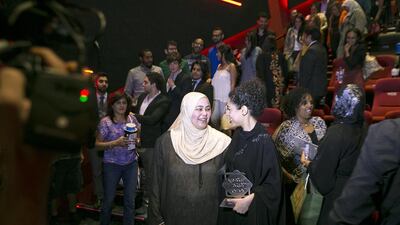Female genital mutilation is a heavy topic for a short film, acknowledges Amena Al Nowais, but one she felt compelled to tackle.
It was the harrowing story of an Egyptian woman that won the 27-year-old Emirati the Best Picture award, for Omnia, at the finale of Image Nation's first Arab Film Studio Documentary competition on Tuesday night.
The subject of the film, 32-year-old Abu Dhabi-based receptionist Omnia Ibrahim, not only attended the ceremony, but beamed, posed for photos and answered questions afterwards.
“I’m really happy that she did, seeing her face, especially for her to see that the movie won, that people were very moved by her story,” said Al Nowais, who found her subject after interviewing four psychologists.
Ibrahim, who has had three years of counselling in an effort to come to terms with the illegal “purification” ceremony performed on her, with her parents’ consent, when she was 10 or 11, welcomed the chance to shed light on the issue.
“It’s not only the prize; that people can see the movie and understand exactly what happened and try to help women in Egypt and Africa and help stop this crime,” she said.
The Abu Dhabi-based Al Nowais, who studied Hebrew and politics at Soas, University of London, is moving into a television researching role with Image Nation and plans to make film her career.
Two of the six filmmakers from the competition, which follows the narrative portion launched several years ago, will take on roles at Image Nation, said Omar Butti, manager of the company’s documentary unit.
The unit, which has produced three full-length projects since launching two years ago, including the polio film Every Last Child, which opens in the United States on June 3, and As One, an autism documentary that screened at last year's Abu Dhabi Film Festival, wants the competition to help in its goal to be an "incubator", said Butti.
“We want much more local talent involved in the process,” he said.
Three of the six Arab Film Studio documentary competitors made films that reflected a cross-generational, father-son conflict, including the Emirati Fayssal bin Sahli's Made of Clay, which won for Best Editing and tells the story of Ahmed, an aspiring stop-motion animation artist. Pakistan's Tanya Daud won Best Cinematography for her short film The Absentees, which told the story of Raees, a Rohingyan refugee working in Dubai, while Waled Al Madani, from Syria, won Best Sound Design for his film The Sheikh of Musaffah, about a father and son who are mechanics.
The winner and finalists were chosen by a judging panel that included Davis Guggenheim, the producer and director of Image Nation's forthcoming documentary I Am Malala (which opens in the US on October 2), Anthony Geffen, the Bafta- and Emmy-winning documentary producer, and The National's editor-in-chief Mohammed Al Otaiba. The National's writers and editors Stacie Overton Johnson, James Langton and Deepthi Unnikrishnan served as advisers on the project.
Image Nation has already started accepting submissions for the second Arab Film Studio Documentary Competition.
• For more details, visit arabfilmstudio.ae
amcqueen@thenational.ae

